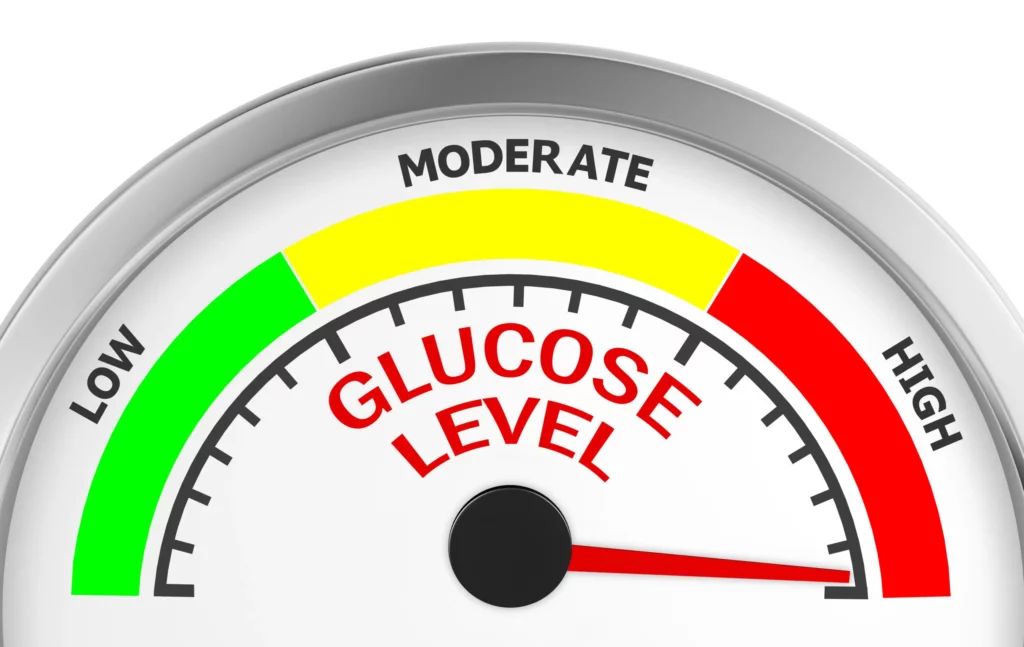

by
|
Did you know that 34 million adults in the US have diabetes, and 88 million adults have
prediabetes? High blood sugar (hyperglycemia) can cause weight gain and long-term health
complications like kidney damage.
If you have diabetes or hyperglycemia, you may also struggle with weight gain. Balancing blood
sugar is the key to losing weight and keeping it off long-term.
This guide will help you learn more about the connection between blood sugar and weight gain
and how you can take back control to live a healthier, higher quality of life with reduced risk of
disease.
Hyperglycemia means high blood sugar or high blood glucose. Hyperglycemia occurs when either the pancreas doesn’t produce enough insulin or the body can’t use the insulin it does have effectively.
Your pancreas releases insulin after you eat. Insulin causes your cells to take glucose out of the blood, which lowers your blood sugar levels.
Your body needs glucose to function since the cells depend on this glucose for energy.
If you have a blood glucose over 125 mg/dL after not eating for eight hours, then you have hyperglycemia. Also, a blood sugar of more than 180 mg/dL for 1 to 2 hours after eating indicates hyperglycemia.
With prediabetes or impaired glucose tolerance, you would have blood sugars between 100 to 125 mg/dL after fasting for eight hours.
It is essential to recognize the symptoms of hyperglycemia. If your blood sugar is too high, you may experience symptoms like:
Frequent urination
Headaches
Blurred vision
Increased thirst
Increased hunger
Blood sugar in your urine
Slow-healing wounds
Weight loss or weight gain
Most of the time, hyperglycemia is linked to too much sugar in the blood due to diabetes. However, this is not always the case.
You can also have hyperglycemia due to stress from an illness. Additionally, a virus or bacterial infection can cause your blood sugar to rise. Other common causes of hyperglycemia include:
Endocrine conditions like Cushing’s syndrome can lead to insulin resistance
Pancreatic diseases like pancreatitis
Pancreatic cancer
Traumatic injuries
The most significant risk factors for developing hyperglycemia include:
Being overweight
Having high blood pressure
Having high cholesterol
Having a history of gestational diabetes
Having polycystic ovarian syndrome (PCOS)
Family history of type 2 diabetes
Being African American or Native American
High blood sugar or hyperglycemia is the main symptom that defines diabetes.
When you initially start having high blood sugar (prediabetes), your pancreas makes more insulin to lower blood sugar levels. Over time, your cells stop responding to the insulin because they become insulin resistant. Eventually, your pancreas can’t keep up with rising blood sugar levels, leading to diabetes.
With type 1 diabetes, your pancreas doesn’t produce insulin. As a result, your cells can’t take in glucose effectively. When this happens, blood sugar builds up in the bloodstream. Type 1 diabetes is most common in children and young adults.
When you have type 2 diabetes, your pancreas doesn’t produce enough insulin, and the insulin it makes doesn’t work as well as it should.
If you have diabetes, you can increase your risks of hyperglycemia further by:
Not taking enough insulin
Not checking your blood sugar regularly
Using expired insulin
Not taking your diabetes medications daily
Not following a healthy meal plan
Having a lot of stress in your life
Recent surgery or injury
You can also get hyperglycemia from diabetes if you don’t exercise daily. You will also have problems if you eat too many carbohydrates. If you do this, the amount of insulin in your body and your insulin injections won’t be enough to counteract the carbohydrates.
If you have diabetes, certain medications like steroids can increase your blood sugar levels.
Finally, people with diabetes can experience the dawn phenomenon, a hormonal surge between 4 and 5 am. This increase in hormones causes blood sugars to rise in the morning.
Weight gain can occur with high blood sugar from insulin resistance. When you eat, your pancreas produces insulin to help move glucose into your cells for fuel. When you have insulin resistance, your cells don’t respond to insulin normally.
Blood sugar then builds up in your blood, which tells the pancreas it needs to make more insulin. Extra insulin causes your body to store the excess sugar as fat.
If you have diabetes, take your insulin and other diabetes medications daily. It is also essential to track your blood sugars each day.
Tracking your blood sugar allows you to detect if it is too high at certain times of the day. This will make it easier to have conversations with your doctor about adjusting your medications or making changes to your diet or lifestyle that could improve blood sugar balance.
It is widely known that no matter your health status–routine exercise is good for your health. If you are new to exercise and looking to take the first step toward balancing your blood sugar, walking for 30 minutes daily is a great place to start. You will also need to find ways to decrease the stress in your life. Mediation and yoga are some of the disciplines that can help you reduce stress.
If you smoke, quitting will have a significantly positive impact on your health. Limit your alcohol intake and take steps to maintain a healthy weight.
Treating weight can be challenging with hyperglycemia. So, it is essential to find a balance. Be sure to start slowly and make small changes each day. Focus on changes you can maintain long-term. You can start with small goals like walking for 15 minutes five times weekly. Then, increase your activity levels from there.
Other steps you can take include:
Scheduling your meals to keep your blood sugar levels stable
Work with a dietitian to cut calories
Eat more fiber
Track your progress
Join a support group
Fill up with non-starchy vegetables first
HRT (hormone replacement therapy) is also an effective therapy for supporting the management of blood sugar levels and facilitating health weight management.
Menopause in women changes how body weight is distributed, leading to an increase in abdominal fat. More abdominal fat leads to problems with inflammation in the body. Elevated testosterone in post-menopausal women leads to insulin resistance.
For men, testosterone therapy can reduce insulin resistance and improve blood sugar.
Hormone replacement therapy (HRT) treats hormonal imbalances in both men and women. The right treatment plan paired with hormone therapy can restore balance and relieve other symptoms of hormone imbalance as well like hot flashes, fatigue and mood swings.
Hormonal balance is an important component of blood sugar balance and healthy weight management for both men and women.
Many HRT therapies are available in pills form. For many people, this method is convenient and straightforward. However, there are other forms of hormone therapy that are often more effective and convenient than pills.
Hormone patches are applied directly to the skin and typically need to be changed twice a week. Hormone patches can be more convenient than pills since you don’t have to remember to take them every day.
On the downside, patches can come off if exposed to too much sweat or water. You won’t get the correct dosage when this happens, reducing the potency and effectiveness of your hormone therapy treatment.
Creams and gels that are rubbed onto the skin once daily are another option for hormone therapy. Creams and gels are convenient for many people and easy to apply. However, the risk of transference to pets, kids and partners is high. If you choose creams or gels be very careful about when and where you apply to cream to avoid exposing others to the hormone.
Creams and gels are also difficult to measure. If you apply too little or too much, you can impact your treatment–enduring hormonal surges or getting too little to experience any relief.
HRT injections are also popular and typically need to be administered biweekly. Sometimes the doses can be monthly or every two months, depending on your prescription. Some people find injections easy since they don’t have to do them frequently and can easily adjust the dosage.
On the other hand, injections can cause hormone surges at the beginning of a treatment cycle, and taper off toward the end of the cycle.. As a result, you may experience symptoms between each injection.
Pellet therapy uses small pellets slightly larger than a grain of rice. These pellets are placed under the skin and last approximately 3 to 6 months. Pellet therapy offers accurate, steady dosing throughout each treatment cycle.
HRT pellet therapy is a popular option for many people. This is because you don’t have to worry about pain and infection from injections. You also don’t need to remember to take a pill daily or hassle with patches that might fall off or creams that require daily application.
The EvexiPEL method of hormone pellet therapy offers superior results. Developed by Dr. Terri DeNeui after 15 years of research, the EvexiPEL Method promotes comfort during and after the procedure, as well as optimizes results throughout each treatment cycle. The result is a pellet therapy experience that achieves both comfort and the highest level of results.
Hormone balance is a key contributor to achieving and maintaining healthy blood sugar balance. If you are at-risk of diabetes or finding it difficult to find blood sugar balance or maintain a healthy weight, it’s time to get your hormones tested. An EvexiPEL Certified provider offers complete lab testing–looking at your whole body health to design a treatment plan that will not only help you achieve your personal goals, but also support your total health and vitality. From hormone therapy and nutraceuticals to cutting-edge therapies, like peptide therapy, get the support you need for optimal health–find a provider near you now.
The post High Blood Sugar and Weight Gain appeared first on EVEXIAS Health Solutions.
